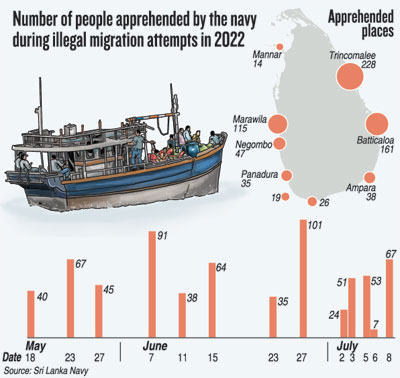News
Hard times trigger surge in people-smuggling; 700 arrested in past 20 days
View(s):By Sandun Jayawardana
The prevailing economic crisis continues to fuel a surge in illegal migration attempts despite local and international efforts to thwart them.
More than 700 persons have been arrested by the Sri Lanka Navy (SLN) alone while attempting to illegally flee the country from May 18 up to July 8. They included infants as young as three months and adults who are nearly 60 years of age. 
In the latest such attempt, 67 people who were allegedly attempting to migrate illegally were detained after a naval patrol intercepted a multi-day fishing trawler off the coast of Kalmunai early Friday (8). The group comprised 53 men including six suspected human smugglers, six women and eight children. They were identified as residents of Mannar, Vavuniya, Mullaitivu, Trincomalee, and Batticaloa. They will be handed over to the Trincomalee Harbour Police for onward legal action, the SLN said.
Separately, police have also arrested several groups of people who were allegedly waiting to board trawlers to leave the island illegally. On July 3, police arrested a group comprising eight men, six women and 10 children while they were waiting at a lodge in Marawila.
There are two main destinations for those attempting to migrate illegally via boat. Some are trying to reach the southern coast of India via small fishing boats. Far larger groups are boarding multi-day fishing trawlers with Australia being the preferred destination.
There has been a surge in boats leaving for Australia since a new government took office in Canberra in late May. Human smugglers are exploiting the situation to mislead people into believing that Australia’s hardline policy towards illegal arrivals by boat has changed.
An increase in illegal migration attempts using multi-day fishing trawlers has been observed from the coast of Mannar up to Negombo and along the coast of Batticaloa up to Trincomalee, Navy spokesman Captain Indika de Silva told the Sunday Times. He said the Navy had strengthened its operations aimed at preventing the smuggling of various contraband and human smuggling attempts. The prevailing fuel crisis has so far not affected the Navy’s operations at sea, he added.
Amid an increase in smuggling attempts, Police and the Navy have also been briefing fisheries associations in the north and east as part of efforts to crack down on human smuggling. Fisheries associations in Jaffna, Mannar, Kilinochchi and Mullaitivu districts have all been briefed, said Anthony Jesudasan, Project Coordinator of the National Fisheries Solidarity Movement. “Fishermen have been advised not to promote or engage in human smuggling and to report any suspicious activity, such as large groups of strangers arriving in their areas. Authorities are pointing out just how risky such attempts are and that all involved are liable to be prosecuted in court.”
Given the country’s dire economic situation, however, many people are ignoring warnings and still attempting to leave, Mr Jesudasan noted.
Human smugglers charge anywhere between Rs. 200, 000 and Rs. 1 million from people attempting to make the perilous crossing to Australia, Police spokesman Nihal Thalduwa said. A trawler must sail in deep waters for at least 14 days to reach the Australian waters. Many of the boats are hardly seaworthy and the smugglers also overcrowd them to maximize profits, he revealed.
“We have found that some of the tips that direct us to intercept boats already at sea come from smugglers themselves as they are unsure about the seaworthiness of their own vessels,” SSP Thalduwa said.
“Anyone thinking of trying to leave the country in this manner needs to understand that there will be serious legal consequences for not just the smugglers but those attempting to leave as well. You can only leave the country from a legal port of entry. You are committing an offence under the Immigrants and Emigrants Act if you attempt to leave illegally. Not only will you stand to lose the money you have paid to the human smugglers, you can also be prosecuted in court and punished if found guilty,” the Police spokesman said.
While many boats have been intercepted by Sri Lankan authorities, a few vessels have managed to get through. The Australian Border Force intercepted three vessels from Sri Lanka in May and June.
The new Australian government, too, has been making efforts to strengthen Sri Lanka’s efforts to fight human smuggling. During her visit to the country late last month, Australia’s Home Affairs and Cyber Security Minister Clare O’Neil and Sri Lanka’s Fisheries Minister Douglas Devananda jointly opened a Fisheries Monitoring Centre (FMC) in Colombo.
The Australian government provided funding to install Vessel Monitoring Systems (VMS) in more than 4000 multi-day fishing trawlers. “The Fisheries Monitoring Centre is an important component that will enable Sri Lankan authorities to monitor the location of the vessels,” a media release issued by Ms. O’Neil’s office said. Among the benefits that the FMC will provide to Sri Lankan authorities will be to “assist in early identification of illicit fisheries practices and irregular vessel movements intended for transnational crime, including people smuggling, which poses risks to economic and security interests of Sri Lanka and other countries,” the release added. As such, the installation of VMS and the setting up of an FMC is partly an effort to combat human smuggling.
“I’m here in Sri Lanka with a really clear message. Australia’s border protection policies have not changed. If you attempt to arrive in Australia by boat you will not make it. You will be intercepted and you will be returned immediately to Sri Lanka,” Ms O’Neil told the media during a joint media conference with Minister Devananda on June 21.
The best way to say that you found the home of your dreams is by finding it on Hitad.lk. We have listings for apartments for sale or rent in Sri Lanka, no matter what locale you're looking for! Whether you live in Colombo, Galle, Kandy, Matara, Jaffna and more - we've got them all!

